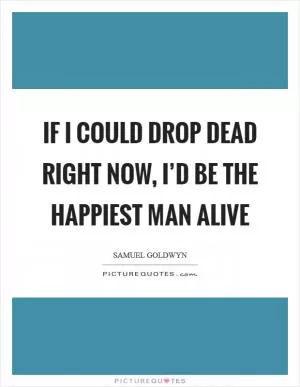I don't think anybody should write his autobiography until after he's dead

I don't think anybody should write his autobiography until after he's dead
Samuel Goldwyn, the legendary Hollywood producer and co-founder of Metro-Goldwyn-Mayer (MGM), was known for his colorful personality, sharp wit, and larger-than-life presence in the entertainment industry. Throughout his career, Goldwyn produced some of the most iconic films in Hollywood history, including "The Best Years of Our Lives," "Wuthering Heights," and "The Little Foxes." His name became synonymous with quality filmmaking and his legacy continues to influence the industry to this day.Goldwyn was also known for his memorable quotes and one-liners, many of which have become part of Hollywood lore. One of his most famous quotes is, "I don't think anybody should write his autobiography until after he's dead." This statement reflects Goldwyn's belief that a person's life story should not be told until they have passed away, allowing for a more objective and honest portrayal of their life and legacy.
In the context of Samuel Goldwyn, this quote takes on a deeper meaning. Goldwyn was a larger-than-life figure in Hollywood, with a reputation for being a shrewd businessman, a creative genius, and a larger-than-life personality. He was known for his strong opinions, his fierce determination, and his unwavering commitment to excellence in filmmaking. Goldwyn's life was filled with triumphs and challenges, successes and failures, and his story is one that continues to captivate audiences and inspire filmmakers to this day.
By suggesting that autobiographies should only be written after one's death, Goldwyn may have been acknowledging the complexities and contradictions of his own life. Like many successful individuals, Goldwyn's life was a mix of highs and lows, victories and defeats, and his legacy is still being debated and discussed by historians, critics, and fans alike. By waiting until after his death to tell his story, Goldwyn may have been allowing for a more nuanced and balanced portrayal of his life and career, one that takes into account the full scope of his achievements and his shortcomings.












 Friendship Quotes
Friendship Quotes Love Quotes
Love Quotes Life Quotes
Life Quotes Funny Quotes
Funny Quotes Motivational Quotes
Motivational Quotes Inspirational Quotes
Inspirational Quotes